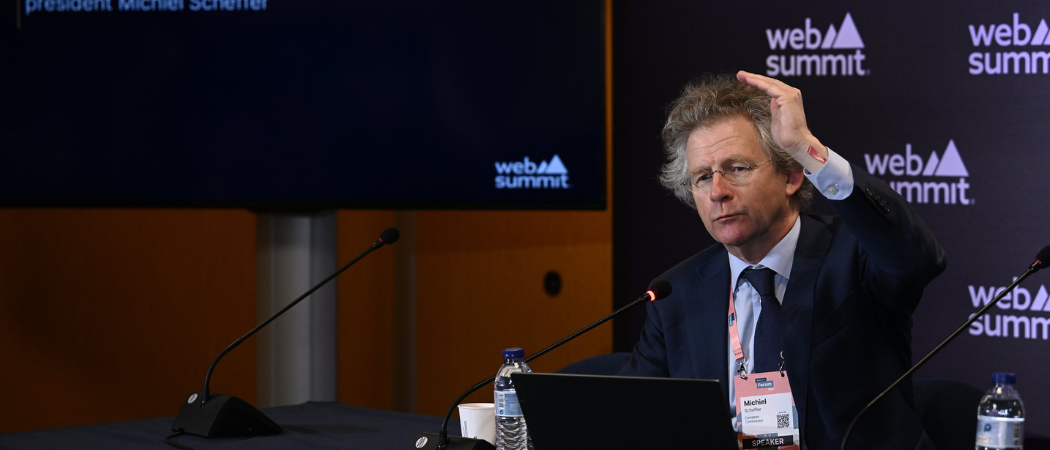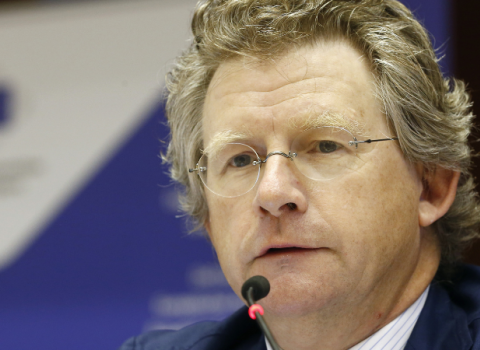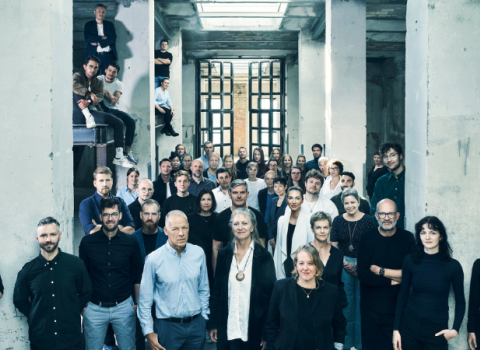The EIC should be more closely modelled on US advanced research project agencies say economists from France, Germany and Italy

Michiel Scheffer, president of the European Innovation Council, during day two of Web Summit 2023 at the Altice Arena in Lisbon, Portugal. Photo credits: Oliver Hardt / Flickr
European investment in research and innovation is “insufficient, in both quantity and quality”, and should focus more on high-tech industries, according to a report by economists from France, Germany and Italy.
They recommend reforming the European Innovation Council, launched in 2021 to develop and scale up breakthrough technologies, along the lines of the US advanced research project agencies (ARPAs). Perhaps the most famous of these, DARPA, funds defence research and has played a leading role in developing technologies such as the internet and global positioning systems.
ARPAs have a mission-oriented approach to innovation, and focus mainly on developing proof of concept, or projects up to technology readiness levels (TRLs) 3-4, whereas half of EIC funding is dedicated to its Accelerator programme, which supports projects at TRL 5 and above.
The economists suggest increasing funding for high-risk, high-return projects by diverting resources from “underperforming programmes of Horizon Europe and other parts of the EU innovation ecosystem”.
For instance, they propose the European Institute of Innovation & Technology (EIT) and the European Innovation Ecosystem (EIE) should be “scale[d] down progressively” saying “it is natural to question the EU value added of the EIT and ask whether its budget could be more efficiently allocated elsewhere.”
They also propose giving leading scientists a more central role on the EIC board and in selecting projects, and handing more decision-making power to independent project managers rather than the European Commission.
The report looks at how Europe can escape the “middle technology trap”, which refers to specialising in sectors that do not require the same R&D intensity as high-tech industries - or have the same potential for growth.
The report points out that many of the European companies which spend the most on R&D are in the automotive sector, and mostly take the latest advances and apply them to production.
“The EU’s comparative advantage in cars is worrisome, as despite its massive investment in R&D, the EU automotive industry now risks being leapfrogged by US producers and increasingly by Chinese ones,” the report says.
In the US software companies have overtaken car manufacturers as the biggest R&D spenders, and now account for 75% of the global total in the sector, compared to just 6% in Europe.
The creation of the EIC has been a “positive step” in boosting European competitiveness, but it focuses too much on helping SMEs to raise capital, and not enough on promoting innovation, the report says. Just 5% of overall Horizon Europe funding supports breakthrough innovation that is far from commercial application.
The EIC is also too dependent on the Commission and is overly bureaucratic, with excessive eligibility criteria and slow payment of funding, according to the report.
Overall, public funding on R&D in Europe has grown in the last two decades to reach a similar level to the US, at around 0.7% of GDP. However, private spending on R&D is currently 1.2% of EU GDP, half that of the US, at 2.3%. The authors point towards the dominance of high-tech companies in the US to explain this discrepancy.
“It is without question that the EU needs to catch up in the field of private R&D investment, reduce energy costs, make financing of scale-ups more attractive and mobilise more private capital into the financing of the economy,” said internal market commissioner Thierry Breton.
He proposes a new approach based on four pillars: promoting industrial technologies; a focus on economic security to protect industrial value chains; modernising the single market; and developing skills.
Competitiveness has emerged as a key concern for EU policymakers in the current fraught geopolitical context, with former Italian prime minister Mario Draghi due to submit a report on the topic in June.
Developing technologies for industrial competitiveness is likely to be high on the new Commission’s agenda following June’s European elections, and at the heart of discussions around Framework Programme 10, the successor to Horizon Europe from 2028.
Last week, ministers from France, Germany and Italy jointly called for the EU to develop a single industrial strategy, in response to American protectionism and Chinese subsidies.





 A unique international forum for public research organisations and companies to connect their external engagement with strategic interests around their R&D system.
A unique international forum for public research organisations and companies to connect their external engagement with strategic interests around their R&D system.